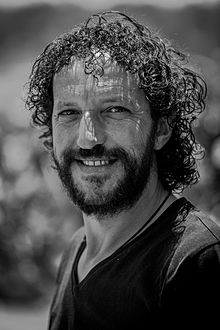Ali Abu Awwad
Ali Abu Awwad is a Palestinian peace activist. He founded Taghyeer , a National Palestinian Nonviolence Movement, in the belief that nonviolence is the only way to bring peace to the region and end Israeli occupation. At the end of 2014 Ali created the Palestinian nonviolence center Karama , on his familys land situated in an area between Bethlehem and Hebron City. In that same year he co initiated Roots with local Israeli activists a local initiative to engage communities and community leaders from both sides in reaching a just solution to the conflict. Ali tours the world to tell his riveting story of violent activism, imprisonment, bereavement and his eventual discovery of nonviolent resistance, which he describes in his book Painful Hope . We will have peace when the painful price of peace will be cheaper than the terrible price of war. His life and work have been featured in two awardwinning films, Encounter Point and Forbidden Childhood. He lives in Beit Ummar, in the Palestini
Awwads family are refugees from AlQubayba near Bayt Jibrin, forced off their land during Al Nakba in 1948 and settling in Beit Ummar before he was born He himself was born in Halhoul, Hebron Governorate in the West Bank. Awwads family was very politically active, and he followed in his mother Fatma s footsteps. Atyears old he saw his mother physically beaten by Shin Bet agents and arrested several times. She spent five years in Israeli prisons and Ali became a leader in Fatah. He served two prison sentences His first arrest occurred while studying for his secondary school exams, after an Israeli helicopter observer reported seeing him throw stones. He refused to pay a 1,500 shekel fine, stating later that, while a stonethrower, he had not stonethrowing on the day in question.He served three months in prison in the Negev. Eight months later, he took part in the First Intifada as a teenager, and was subsequently sentenced toyears in prison in Israel on charges of stonethrowing,
Source: Wikipedia

